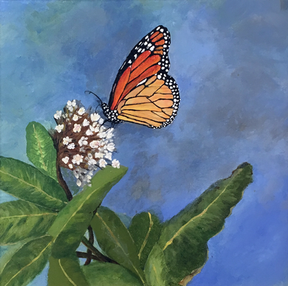THOREAU AT MACKINAC
In 1861, Henry David Thoreau was dying of tuberculosis at just 44 years old. In those days, medical experts believed the best course of treatment was a change of environment, and Mackinac Island was known as a place with healing properties. Thoreau, whose life was spent studying the natural world, journeyed from Concord, Massachusetts on a trip that would take him through the heart of the Midwest and the Great Lakes. In early July 1861, he arrived at Mackinac with his traveling companion, Horace Mann Jr. The pair stayed for several days at the “Mackinac House” hotel, located where the Mackinac Island Tourism Bureau building now stands.
To celebrate the bicentennial of Thoreau’s birth, the Mackinac Arts Council assembled an exhibit featuring artwork inspired by Thoreau’s visit to Mackinac Island, created by artists who have visited or live on Mackinac Island. Accompanying the exhibit was a book of writing about Thoreau and transcendentalism by local and regional authors. A new musical composition by Petoskey composer, Tony Manfredonia, was commissioned for the occasion and premiered by the Straits Area Concert Band in this theater on July 8, 2017, along with readings and other music inspired by Thoreau.
The project was conceived by Fr. Jim Williams, longtime Mackinac resident and former pastor at Ste. Anne Catholic Church on Mackinac Island. Thoreau at Mackinac was made possible through a generous donation by John Barr.


Excerpt from "Walking among the stars with Henry Thoreau on Mackinac Island," the prize-winning essay by Pete Olson, published in Thoreau at Mackinac.
I read Walden for the first time about ten years after the passage of the Wilderness Act, and certainly within that context of the need to preserve large tracts of land where we were already spending as much time as possible, camping, hiking, climbing, and struggling to grow up within the humbling presence of the Rocky Mountains. With the help of dozens of ad campaigns and even some scholarly books, it was easy to misread “…in wildness is the preservation of the world” into the much less risky anthem of the 60s and 70s “…in wilderness is the preservation of the world.” (“Walking”) So it was perhaps not a surprise that I was thoroughly disappointed in my first actual visit to Walden Pond near Concord, Massachusetts in 1981. With the “wilderness” concept still firmly in mind, I was horrified at the landfill resting just across Mass 126; this was anything but a “wilderness”! How could Thoreau possibly have written Walden here?
Last summer, my daughter Kaia and I walked clock-wise around Walden Pond; it didn’t take long, perhaps only 45 minutes or so, given our leisurely pace. I had visited Walden again after that first disappointment, but this was the first time I walked around the pond, so I suppose that makes calling what we did a “circumambulation” a bit pretentious, but our walk, at least for me, did certainly have a ritual feel to it, a touch of the sacred hovering between “wildness” and “wilderness.” It also didn’t hurt that the landfill was mostly covered over, in part by a beautiful new visitor’s center, nearly completed. As we walked I worked to fit the path beneath our feet into patterns of memory triggered by many much longer “walks” through Thoreau’s pages than I had taken in the 70s.
Copyright © 2017 by John Barr, Kevin Barton, Betty Cavanaugh, Rachel Cline, Maeve Croghan, Chloe Herscher, Jeffry Riordan Hinich, James P. Lenfestey, Tony Manfredonia, Kyle Miller, Bill Murcko, Pete Olson, Philip Rice, Tammy Rose, Corinne H. Smith, Anne St. Onge, Glen Young, and Natalia Wohletz.
Love Awakens was commissioned for Thoreau at Mackinac and premiered by the Straits Area Concert Band under the direction of Doug White. Tony Manfredonia is a composer living in Petoskey, MI.

“Love is an attempt to change a piece of a dream-world into a reality.”
—Henry David Thoreau















